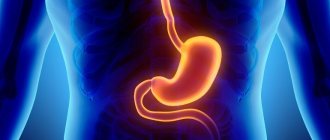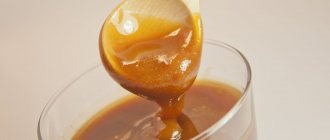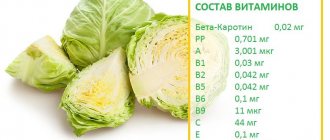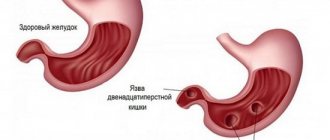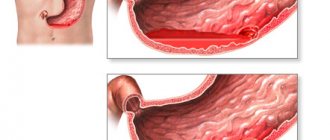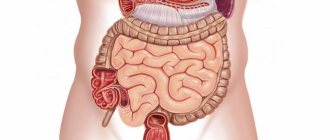More about pathology
Stomach ulcer is a chronic disease. It is characterized by irritation and damage to the mucous membranes due to the influence of hydrochloric acid contained in the gastric juice.
An exacerbation of peptic ulcer disease is considered to be a sharp increase in the symptoms of the pathology after a period of remission; the disease is characterized by seasonal periodicity. Most often, spring or autumn periods of exacerbation occur, which last from 2-3 to 6-8 weeks. Exacerbations occur more often in men than in women.
Exacerbation of gastric ulcers in women is possible with dysmenorrhea, after an abortion, during menopause. Pregnancy often leads to remission.
Signs that the ulcer has worsened in adolescents or young adults are not so pronounced or similar to the symptoms of a duodenal ulcer.
The pain is mild, there is heartburn, complications are rare. In old age, pain is also less pronounced, more diffuse in nature, and often radiates to the shoulder, back, and collarbone. Those people whose work involves frequent stress, who abuse alcohol, or smoke are more at risk of developing stomach ulcers. Stomach ulcers often occur in those who do not follow the principles of proper nutrition, eat dry food, and often consume carbonated drinks, spicy and fried foods.
Drug treatment
Along with prescribing a diet, the attending physician prescribes drug therapy for exacerbation of a stomach ulcer. You should not independently treat the acute period of a peptic ulcer, so as not to wait for the development of serious complications.
A gastroenterologist will prescribe laboratory and instrumental studies and, based on the results, an individual therapeutic regimen. First of all, conservative therapy is aimed at destroying the microorganism Helicobacter pylori in the stomach, which causes pathological processes in the stomach.
Antibacterial therapy
To destroy Helicobacter pylori, the patient is prescribed certain antibiotics. There are three types of effective antimicrobial agents that relieve exacerbation of gastric ulcers.
- Macrolide group drugs. Clarithromycin is often used. The drug erythromycin is older, it is used much less frequently, and is considered no longer relevant. It is suggested to take the medicine twice a day
- Amoxicillin is a drug from the penicillin group. Take the tablet twice a day.
- Metronidazole, trichopolum is an antimicrobial and antiprotozoal drug that is effective for gastric ulcers.
Reducing the acidity of gastric juice
An ulcer is not always caused by a microbe; in some cases, the pathology is aggravated by taking medications that have a detrimental effect on the stomach. In such cases, drugs are prescribed that reduce the activity of gastric juice and protect the walls of the stomach.
- Histamine receptor inhibitors – ranitidine.
- Proton pump inhibitors – omeprazole. They are used more often than the first group due to their greater efficiency.
- Antacids - Maalox, phosphalugel. Reduce acidity levels and make gastric juice less aggressive.
- Gastroprotectors – de-nol, bismuth preparations.
The prescribed medicine is taken for two weeks. In combination with medications, it is not prohibited to treat ulcers using traditional methods.
Against the background of the therapy, the manifestation of inflammation and ulcerative process gradually stops. For preventive purposes, it is recommended to adhere to a diet, give up bad habits, and avoid stressful situations.
The cause of the pathology
The cause of stomach ulcers is considered to be the presence of the bacterium Helicobacter pylori, which negatively affects the mucous membrane of the digestive organ, contributing to its damage. Hydrochloric acid, penetrating these areas of the mucosa, promotes inflammation, forming an ulcer.
The cause of an exacerbation of an ulcer may be stress, which causes a spasm of the gastric walls, leading to a failure of the circulatory process and blood supply. Gastric juice has a destructive effect on the mucous membrane, causing an inflammatory process.
Other provoking factors include:
- severe injuries;
- eating too hot foods;
- frequent smoking on an empty stomach while drinking strong coffee or tea;
- physical stress;
- non-compliance with diet;
- use of certain types of medications: Reserpine, Ibuprofen, Aspirin, Indomethacin and others;
- the presence of certain types of infections.
Main reasons
Most often, exacerbation of duodenal or stomach ulcers awaits people in the fall and spring. It is at this time that the body spends a lot of strength and energy adjusting to new conditions. Protective functions weaken, and immunity to various infections becomes vulnerable.
Severe non-compliance with a special diet is another reason. For example, after a feast with an abundance of fatty, sweet, smoked and alcoholic foods, a person may feel a sharp pain in the stomach. This is caused by oxidation of the mucous membrane due to junk food.
Heavy smoking is considered a cause of exacerbation of ulcers. Therefore, it is men who most often suffer from this disease, since smoking is most widespread among them.
The disease is aggravated by severe or sudden stress. Many believe that the appearance of the disease in some cases is due to experiences. Against the background of an already developing disease, unexpected shocks, as well as a state of constant anxiety, deal a serious blow to the ulcer.
An exacerbation may begin due to taking medications that affect the acidic environment of the intestines and stomach. When prescribing such medications, doctors usually check with the patient about the presence of an ulcer, but if this does not happen, be sure to report your illness. This will protect you and your stomach from negative consequences.
Physical activity that is disproportionate to the capabilities of the affected body is another reason for the aggravation of the disease. Doctors say that if a person has a stomach ulcer, he should either completely limit himself in sports, or engage in it moderately and very carefully. During the period of an acute ulcer, of course, physical activity must be completely avoided. It will be possible to return sports to life during a period of improvement.
So, summarizing the above, we will highlight the following main reasons for the exacerbation:
- infection, cold;
- errors in nutrition;
- bad habits;
- constant anxiety, stress;
- taking inappropriate medications;
- increased physical activity.
The disease will never take you by surprise if you are one step ahead of your ulcer.
When a person is aware of the characteristics of his ulcer, he can predict the onset of an exacerbation. To know about the condition of a diseased stomach, doctors advise keeping a diary in which all the organ’s reactions to current events are recorded. This will make both the doctor’s work investigating the disease and your life easier.
Symptoms of the disease
During an attack of an ulcer, pain appears at the location of the ulcer. Based on the nature of the complaints, the doctor can quickly determine the presence of an ulcer in a certain part of the stomach:
- subcardial and cardiac sections . Painful sensations appear 20 minutes after eating and can sometimes radiate to the heart. Drinking milk or antacids can relieve discomfort. The pain is quite mild in intensity and may be accompanied by belching, heartburn, and vomiting;
- lesser curvature of the stomach . Pain is felt in the epigastric zone, which is located in the left middle zone of the abdomen; these pains are observed after eating an hour later, during fasting, in the evening and at night. During remission, the pain is moderate; when an exacerbation occurs, it becomes intense and acute; nausea, sometimes accompanied by vomiting, is also noted;
- greater curvature of the stomach . Almost imperceptible pain makes diagnosing the disease difficult. This type of stomach ulcer is quite rare and is usually malignant;
- antrum . Painful sensations appear in the epigastric region in the evening or at night, often accompanied by heartburn and sour belching;
- pyloric canal . If this part of the stomach is damaged, intense paroxysmal pain is observed, which can last up to 40 minutes. They usually appear at night or during hunger, and the pain is often accompanied by heartburn.
Depending on the time of onset of pain in connection with food consumption, symptoms may be:
- Early (appears after eating in half an hour to an hour).
- Late (appears after 2 hours).
- “Hungry” (appears after 6-7 hours and disappears after eating).
- Nocturnal (similar in character to “hungry”).
“Hungry” and night pain are more typical for duodenal ulcers. But they can also be observed when the pathology is located in the lower parts of the stomach.
Pain during exacerbation of a gastric ulcer differs in that it is characterized by a localized location - from the midline to the left. Perforation of the ulcer is indicated by prolonged pain that radiates to the back.
Resistance to medications, transformation of the rhythm of pain, manifestations of irradiation indicate the development of complications or the occurrence of a concomitant disease.
In addition to pain, in an acute moment a stomach ulcer can manifest itself with the following symptoms:
- vomit;
- belching;
- nausea;
- constipation;
- black stool;
- heartburn.
Vomiting and black stool indicate the presence of internal bleeding.
At the initial stages of development, the symptoms are vague, most of the signs are similar to the symptoms of other gastrointestinal pathologies, but quick relief from the pathology at this stage is still possible when the disease is diagnosed in time. Initially, the inflammatory process occurs sporadically, from case to case, 1-2 times a year. Inflammation of the mucous membrane leads to permanent and acute pain in the epigastric region, discomfort, disruption of the digestive process, and deterioration in general health.
The clinical picture of an exacerbation of the disease may be individual, with the absence of some signs, but the main symptoms indicate a disruption of the digestive organs.
How to identify an exacerbation
A stomach or duodenal ulcer is accompanied by periods of remission and exacerbation.
As the disease worsens, a person experiences severe abdominal pain, weakness, nausea and vomiting.
The duration of the acute period varies from one to several weeks, depending on the severity of the disease.
So, the symptoms of an exacerbation of an ulcer include:
- severe pain of different types in the stomach: stabbing, cutting, dull, dagger-like, cramping, etc.;
- reflux (sour belching);
- nausea, weakness;
- vomiting, after which the patient feels relief;
- decreased appetite;
- bloating;
- problems with stool (prolonged constipation, diarrhea);
- a sharp increase in body temperature;
- insomnia, irritability.
It is noted that the nature and time of onset of pain depends on the location of the damage. If the ulcer is located in the upper part of the stomach, then pain occurs after eating, which goes away after 1.5-2 hours. If discomfort occurs 2-3 hours after eating, this is a sign that the gastric mucosa is damaged in the middle part or closer to the duodenum. Pain that occurs when the stomach is empty and at night indicates an intestinal ulcer.
Sometimes a person who is faced with an exacerbation of an ulcer is in no hurry to see a doctor, because he knows that this is a temporary phenomenon. This position, however, will only harm both the stomach and the entire body. If the disease is not stopped in time, gastric bleeding or perforation of an ulcer may begin.
Only a qualified specialist has the right to prescribe treatment and select medications. Therefore, at the first symptoms of an exacerbation of an ulcer, you should immediately call an ambulance or consult a doctor.
Stages of pathology
This pathology has a number of stages:
Mild exacerbation. Appears once within two years. It proceeds without complications, is blocked quickly, within 7 days. Over the next week of intensive treatment, symptoms disappear and the ulcer heals.
Moderate exacerbation. It occurs at least twice a year. Accompanied by severe symptoms that last up to 3 weeks. The difficulty lies in the bleeding that occurs. The patient needs to change his lifestyle.
Exacerbation of the severe stage. It appears more often than twice a year. Symptoms include perforation of the ulcer, significant weight loss in the patient, bleeding, and degeneration of the ulcer into cancer.
Treatment of stomach ulcers with traditional methods
Folk remedies are popular in the treatment of peptic ulcers. However, it is better to discuss any of the following recipes with your doctor and certainly combine them with medication to treat the disease:
- Dissolve 10 drops of propolis in 100 grams of water or milk, take three times a day, immediately before meals.
- 2 tbsp. Grind dried plantain leaves and brew in 200 ml of boiling water, use as tea for a month.
- Mix 250 grams of crushed aloe leaves with the same amount of honey, add a small slice of butter, put on low heat and bring to a boil, remove from heat, cool. Take 1 tbsp on an empty stomach. one hour before meals.
- Dilute freshly squeezed potato juice with an equal amount of boiled water (it is recommended to take 100 ml of liquids), take on an empty stomach 40 minutes before meals. It is not recommended to use stale (more than six months) potatoes.
- It is recommended to drink freshly squeezed cabbage juice in an amount of up to 200 ml 1-4 times a day.
- In the morning on an empty stomach, place a mummy tablet under your tongue, wait until it dissolves, then have breakfast with 100-200 grams of fresh cottage cheese, do not eat or drink anything for the next 3 hours. The course lasts up to one month.
Reason for exacerbation
A stomach ulcer can proceed relatively calmly and not cause concern to the patient until an exacerbation begins, which depends on certain factors:
- off-season period (spring or autumn);
- non-compliance with the principles of proper nutrition and frequent overeating;
- consumption of harmful foods, carbonated drinks;
- bad habits - smoking and alcohol abuse;
- heavy physical activity;
- depression and frequent stress;
- eating very hot or cold foods.
Basic medicines for stomach ulcers
If suddenly a person suspects a stomach ulcer, he should urgently go to the hospital for help. After the examination, the doctor will select the safest treatment regimen.
Antibiotics
Antibiotics prevent infection during an exacerbation of an ulcer, improve the general condition of the body, and also suppress pathogenic viruses, including H. pylori.
The list of antibacterial drugs prescribed to the patient includes macrolides, penicillins, nitromidazole derivatives and tetracyclines.
Complications of stomach ulcers
An attempt without appropriate treatment to wait out an exacerbation, which usually occurs in the fall or spring, can result in complications that pose a threat to life:
- The gastric walls are destroyed (penetrations).
- Holes appear in the gastric wall (perforations).
- Oncological diseases (malignancy) develop.
- Bleeding occurs.
- Pyloric stenosis develops.
Etiology
The main cause of this disease is the penetration of the bacterium Helicobacter pylori into the body. A large number of factors can cause an exacerbation of gastric ulcer. These include:
- maintaining an unhealthy lifestyle, which implies a long-term addiction to drinking alcoholic beverages and smoking;
- indiscriminate use of medications over a long period of time, without a doctor’s prescription or with non-compliance with the dosage;
- the influence of severe stress;
- addition of a secondary infectious process to the main disease;
- a wide range of injuries to the anterior abdominal wall;
- strong physical activity;
- increased levels of calcium in the body;
- eating large amounts of junk food. For example, fatty and spicy foods, carbonated drinks and fast food.
The main risk group is people fifty years of age and older. In addition, there is a seasonality in the occurrence of exacerbations of this disease. They are often observed in the autumn-spring period, and in summer and winter the patient’s condition completely normalizes.
In males, this disorder is observed several times more often than in females. Peptic ulcer disease in women can worsen during menopause, after abortive termination of pregnancy, as well as during painful menstruation. The period of bearing a child, on the contrary, leads to remission.
First aid for exacerbation
If an ulcer worsens, you should know what to do:
- provide peace;
- temporarily exclude food intake, later eat in accordance with a strict diet;
- a perforated ulcer is characterized by bleeding, so it makes sense to apply a cold heating pad;
- Take painkillers to relieve aggravation and pain.
It is recommended to pay special attention to the nature of the pain, its duration, and degree of intensity. Complications require hospitalization. Sharp pain with a rapid deterioration in health may be evidence of perforation of the ulcer. Vomiting with blood indicates internal bleeding.
First aid for an exacerbation is to quickly eliminate symptoms and provide conditions for rapid healing of the ulcer. Bismuth preparations and antacids will help relieve pain. These are: “Maalox”, “Bismofalk”, “De-Nol”, “Rennie”, “Tribimol”, “Vikalin”, “Bismol”, “Almagel”, others.
If these drugs do not help, it is allowed to use antispasmodics “No-shpa”, “Papaverine” or anticholinergics – “Metacin”, “Gastrotsepin”. Antibiotics or other anti-ulcer medications should only be prescribed by a doctor.
Diet for exacerbation of peptic ulcer
A necessary condition for eliminating an exacerbation is the normalization of the diet and nature of nutrition. It is important to follow the rules and principles:
- After eating, the mucous membrane should not experience irritation.
- Products that increase the production of hydrochloric acid are excluded from the diet.
- Dishes for a patient with an ulcer should not be hard. In the acute period, it is necessary to give preference to grated and semi-liquid dishes.
- A single serving should not be too large. It is optimal to stick to the portion that fits on the saucer.
- Meals should be frequent.
- Food should not be cold or hot. It is optimal to eat foods that are slightly warm or at room temperature.
- The amount of table salt is kept to a minimum.
The fight against exacerbation of stomach ulcers involves milk and dairy products in the diet. They have an enveloping effect on the stomach wall.
The products should not contain an excess of refractory animal fats, rich meat, mushroom broths, or raw coarse vegetable fiber. Eliminate beans and corn from your diet. The calorie content of the daily diet should not exceed 3000 calories.
How to treat a worsening stomach ulcer
It is impossible to cure a stomach ulcer and prevent its exacerbation using one method. It is necessary to use complex treatment, which is aimed at getting rid of the pathogenic bacteria, reducing the acidity of gastric juice, eliminating associated symptoms.
If there is a suspicion of an exacerbation, urgent hospitalization is required.
The most important thing in treating pathology is to eliminate the cause of inflammation. To do this, it is important to follow these rules:
- stop smoking, alcohol;
- maintain a daily routine;
- avoid stressful situations;
- a diet is required for exacerbation of stomach ulcers;
- you should take medications recommended by your doctor: this is usually the simultaneous use of 3-4 drugs - Nizatidine, Likvirshpon, Cimetidine, Almagel, Flacarbine, vitamins E and B1 and others, in various combinations.
To alleviate the patient's condition, physiotherapy, traditional medicine and spa treatment can be used.
Folk remedies
At home, in the absence of the required medications, an attack can be relieved using traditional methods. Baking soda is often used for this, but it is considered a strong antacid and can lead to side effects.
To relieve pain, you can drink water with honey dissolved in it, warm milk, or rose hips. Decoctions based on orchis, lemon balm, calamus, caraway, sage, chamomile, sweet clover, and oats have an enveloping and analgesic effect. They can simply be brewed with boiling water, and for a more effective effect, you can prepare the following remedy.
Pour 2 tbsp white wine (0.5 l). spoons of thyme and put the mixture in the refrigerator for a week. After a few minutes, boil and strain. Take 2 teaspoons of infusion before meals.
A decoction is prepared in milk from the herbs chamomile, yarrow and celandine. Infuse the mixture for several hours and then drink it throughout the day.
Infusions are most effective when brewed in a thermos. Infusions of chamomile with flaxseed, licorice root or elecampane are well suited for this.
Bee products help a lot:
- propolis (10 g) is eaten daily, chewing thoroughly, for a month;
- A remedy made from sea buckthorn with honey is effective. 3 tbsp. Boil tablespoons of sea buckthorn for 10 minutes in a glass of water and add 3 tablespoons of honey. Drink the infusion on an empty stomach in the morning, 0.5 teaspoons.
Nutrition during exacerbation
What can and cannot be eaten during an exacerbation of a stomach ulcer? Anything spicy, fatty, fried, or pickled is excluded from the diet. Canned foods, sauces, baked goods, rich broths, coffee, and smoked foods are prohibited. Alcohol is strictly excluded. Vegetables and fruits that irritate the gastric walls. Consumption of bread, sour cream, grapes, and strong tea can lead to complications of the pathology.
The menu should include the following foods:
- Slimy lean soups.
- Omelettes and soft-boiled eggs.
- Liquid porridges (oats, rice, semolina).
- Kissels, compotes.
- Low-fat cottage cheese.
- Lean meats and poultry.
- Honey.
Video on the topic:
Depending on the stage of exacerbation and the severity of symptoms, anti-ulcer diets are used: “Table No. 1a”, “Table No. 1b” and “Table No. 1”.
The anti-ulcer diet is based on the principle of sparing the stomach. Thermal - involves eating food at room temperature. Chemical - excludes products that lead to increased secretion. Mechanical – involves eating food in liquid or pureed form.
There are other principles of dietary nutrition during exacerbation of ulcers:
- you should eat often;
- portions should be small;
- You can't eat at night.
Nutrition
During an exacerbation of the disease, diet is required. Therefore, it is important to know what you can eat and what foods are prohibited.
In the first week, it is necessary to adhere to diet No. 1. The patient is recommended to eat pureed soups with buckwheat, pearl barley, rice or semolina. You are allowed to drink jelly, rosehip decoction, and weak tea.
The following are also considered useful dishes during exacerbation of the disease:
- lean meat (turkey, chicken, rabbit);
- lean sea fish;
- liquid porridge;
- steam omelette;
- low-fat broths;
- souffle of fish, meat or vegetables;
- fresh cottage cheese;
- jelly.
Prohibited foods include:
- fatty foods;
- pickles;
- sweets;
- coffee;
- dairy products;
- smoked meats;
- sausage;
- pasta;
- baked goods;
- White bread;
- fermented milk food;
- confectionery;
- alcoholic drinks;
- fast food;
- fresh vegetables and fruits;
- sauces and mayonnaise;
- seasonings and spices;
- carbonated drinks.
You need to avoid high salt intake. You are allowed to eat less than 6 grams per day.
Meals should be small - a small portion is enough, but the frequency of eating increases up to six times.
Dishes should not be cold and not too hot . They should be steamed, boiled or baked in the oven.
Food must be chewed thoroughly. It is also important to establish a drinking regime. You need to drink at least two liters of fluid per day.
Prevention of exacerbation
To prevent exacerbations of ulcers, you need to adhere to a healthy lifestyle, eat right, exercise, ensure healthy sleep and walks in the fresh air. An equally important condition is the timely treatment of gastrointestinal pathologies.
List of references: https://www.alfazdrav.ru/zabolevania/zabolevaniya-zheludka/yazvennaya-bolezn-zheludka/ https://ru.wikipedia.org/wiki/Stomach_ulcer https://www.kp.ru/guide/ lechenie-jazvy-zheludka.html https://gkb64.ru/yazvennaya-bolezn-zheludka/ https://www.gmsclinic.ru/diseases/peptic-ulcer https://www.yamed.ru/services/gastrojenterologiya/ yazvennaya-bolezn/ https://www.medkompas.ru/about-health/diseases/yazva-jeludka/ https://www.1spbgmu.ru/images/home/universitet/Struktura/Kafedry/Kafedra_terapii_fakultetskoy/lektsii/gastroenterology3. pdf https://www.nrmed.ru/rus/dlya-vzroslykh/gastroenterologiya/yazvennaya-bolezn/ https://newizv.ru/news/society/24-09-2010/133799-sezonnoe-obostrenie https:// kr-gazeta.ru/obshchestvo/SezonnyeobostreniyaKakuspokoityazvu/ Notes from the author of the article, based on personal experience. This material is purely subjective and is not a guide to action. Only a qualified specialist can determine an accurate diagnosis and prescribe treatment.
Last modified: 03/18/2020
Treatment
Treatment of exacerbation of a stomach ulcer should be aimed at eliminating the root cause of the disease. In this case, the main goal of therapy is to reduce the level of acidity and ensure protection of the mucous membrane from the aggressive effects of hydrochloric acid.
To achieve the effect, the patient is prescribed appropriate medications and dietary nutrition. Due to the danger of the disease, treatment should only be carried out under the supervision of a doctor.
Medicines
In case of exacerbation, treatment of stomach ulcers is carried out with medication. The course of therapy is developed individually, depending on the severity of the disease. Most often, patients with recurrent ulcers are prescribed medications from the following groups:
- Antacid gels, emulsions, tablets and solutions. These drugs reduce the aggressiveness of gastric juice, protecting the mucous membrane from damage. These include Gaviscon, Gastal, Vikalin and Maalox.
- Cytoprotectors. Helps increase the protective function of the mucous membrane. The most popular cytoprotectors are: Andapsin and Sucralfate.
- Antisecretory drugs. Helps reduce the production of hydrochloric acid. The most popular medications in this group are Gastrosedin, Ultop, Omeprazole.
- Antibiotics. These funds are necessary to combat bacteria that provoke the development of ulcers. As a rule, broad-spectrum drugs are used, such as Azithromycin, Amoxacillin and Metronidazole.
- Probiotics. These medications restore the body's own microflora and prevent the development of dysbacteriosis. Most often, patients are prescribed drugs such as Linex and Lactobacterin.
- Sedatives – extracts of motherwort and valerian.
Important! In addition to the medications described above, the patient should take vitamin complexes in order to generally strengthen the body.
Diet
Proper nutrition for stomach ulcers during an exacerbation is the key to a speedy onset of remission. The patient's daily diet should consist of the following products:
- light soups and broths;
- lean poultry and meat;
- liquid porridge (rice, semolina, buckwheat);
- omelettes and soft-boiled eggs;
- skim cheese;
- honey.
A diet for stomach ulcers requires excluding the following foods from the diet:
- alcoholic drinks;
- flour products, baked goods;
- fatty, fried, salty and smoked foods;
- hot sauce and spices;
- drinks containing caffeine;
- sauces, marinades and pickles.
Nutrition should be balanced. The patient needs to adhere to the specialist’s recommendations and inform him of the slightest changes in well-being.
Symptoms
Symptoms of exacerbation of a stomach ulcer differ in their intensity and duration. Depending on the location and nature of the pain, doctors diagnose the degree of complications. In order not to resort to radical methods, you need to seek professional help in time if you discover the following problems:
- Severe stomach pain (symptoms may worsen at night). During exacerbations, painful sensations are localized in the solar plexus area.
- Heartburn. It occurs against the background of increased acidity of the stomach, due to which the mucous membranes cannot resist aggressive enzymes, and the patient suffers from a burning sensation after eating food.
- Poor appetite. It manifests itself for 2 reasons: the first is psychological in nature and is associated with the fact that a person reduces the number of meals due to fear of pain, and the second affects disorders in the digestive system.
- Constant nausea. The development of a gag reflex with blood discharge cannot be ruled out. This phenomenon is explained by abnormalities in gastric motility.
- Belching, accompanied by a sour or bitter taste in the mouth. Symptoms occur due to increased acidity.
- Heaviness in the stomach.
- Frequent constipation and flatulence.
If you encounter 2-3 of the listed signs, go to the clinic as soon as possible and tell your doctor about the nature of the discomfort.
Diet selection
The first thing to do when an ulcer worsens is to follow a diet. Nutrition has a great influence on the human body, so if you choose the right diet, you can speed up the wound healing process and prevent the progression of unpleasant symptoms.
The following products should appear on the daily menu:
- Dietary soups and chicken broths.
- Meat with minimal fat content.
- Liquid porridge.
- Omelettes and egg products.
- Skim cheese.
- Bee Honey.
A strict diet prohibits the consumption of the following:
- Alcohol.
- Butter and flour products.
- Smoked dishes.
- Drinks with caffeine.
- Hot sauces, marinades and pickles.
The key requirement for the form of nutrition is balance and adherence to a schedule. The patient should follow the doctor's advice and point out any deviations from the normal state.
Diet principles
When choosing food for your diet, you need to exclude those foods that will increase acidity in the stomach, as this will only aggravate the problem. It is forbidden to starve or endure discomfort.
It is also necessary to adhere to the following principles:
- The food is exclusively dietary and does not irritate the mucous membranes.
- Products should be easily absorbed by the body, so it is better to consume them in liquid or crushed form.
- Hot and cold dishes are contraindicated, because... they stop the process of enzyme formation and prevent the restoration of mucous membranes. The optimal temperature varies between +26…+33ºС.
- You need to eat food in small portions and not take breaks for more than 3 hours. The interval between doses depends on the patient's condition.
- The optimal drinking regime is 1.5-2 liters of clean drinking water per day.
The first diet, which allows you to speed up the healing of ulcers and reduce discomfort in the stomach, was developed by nutritionist Mikhail Pevzner.

